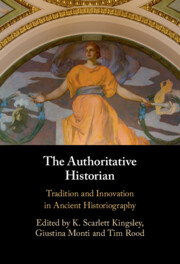Book contents
- The Authoritative Historian
- The Authoritative Historian
- Copyright page
- Dedication
- Contents
- Contributors
- Preface
- Abbreviations
- Introduction
- Part I Myth, Fiction, and the Historian’s Authority
- Chapter 1 Seven Types of Fiction in the Greek Historians
- Chapter 2 Folktale and Local Tradition in Charon of Lampsacus
- Chapter 3 Mythical and Historical Time in Herodotus
- Chapter 4 Myth and History in Livy’s Preface
- Part II Dislocating Authority in Herodotus’ Histories
- Part III Performing Collective and Personal Authority
- Part IV Generic Transformations
- Part V Innovation within Tradition
- Bibliography
- Index Locorum
- General Index
Chapter 3 - Mythical and Historical Time in Herodotus
Scaliger, Jacoby, and the Chronographic Tradition
from Part I - Myth, Fiction, and the Historian’s Authority
Published online by Cambridge University Press: 02 December 2022
- The Authoritative Historian
- The Authoritative Historian
- Copyright page
- Dedication
- Contents
- Contributors
- Preface
- Abbreviations
- Introduction
- Part I Myth, Fiction, and the Historian’s Authority
- Chapter 1 Seven Types of Fiction in the Greek Historians
- Chapter 2 Folktale and Local Tradition in Charon of Lampsacus
- Chapter 3 Mythical and Historical Time in Herodotus
- Chapter 4 Myth and History in Livy’s Preface
- Part II Dislocating Authority in Herodotus’ Histories
- Part III Performing Collective and Personal Authority
- Part IV Generic Transformations
- Part V Innovation within Tradition
- Bibliography
- Index Locorum
- General Index
Summary
‘At the very beginning of non-contemporary history there was myth.’1 Thus wrote John Marincola, in a much-cited section of Authority and Tradition in Ancient Historiography devoted to history and myth or, more precisely, the ways in which historians established authority by their exclusion, and occasional inclusion, of myth. One of the attractions of Marincola’s discussion is that he stresses not just the reaction against the ‘mythical’ that was one of the hallmarks of the historiographic tradition at least from Thucydides onwards, but also the continuing importance of myth for writers such as Diodorus Siculus and Dionysius of Halicarnassus. ‘The charms of myth, like those of the Sirens’, he concludes, ‘were simply too great to resist.’2
- Type
- Chapter
- Information
- The Authoritative HistorianTradition and Innovation in Ancient Historiography, pp. 62 - 81Publisher: Cambridge University PressPrint publication year: 2023

